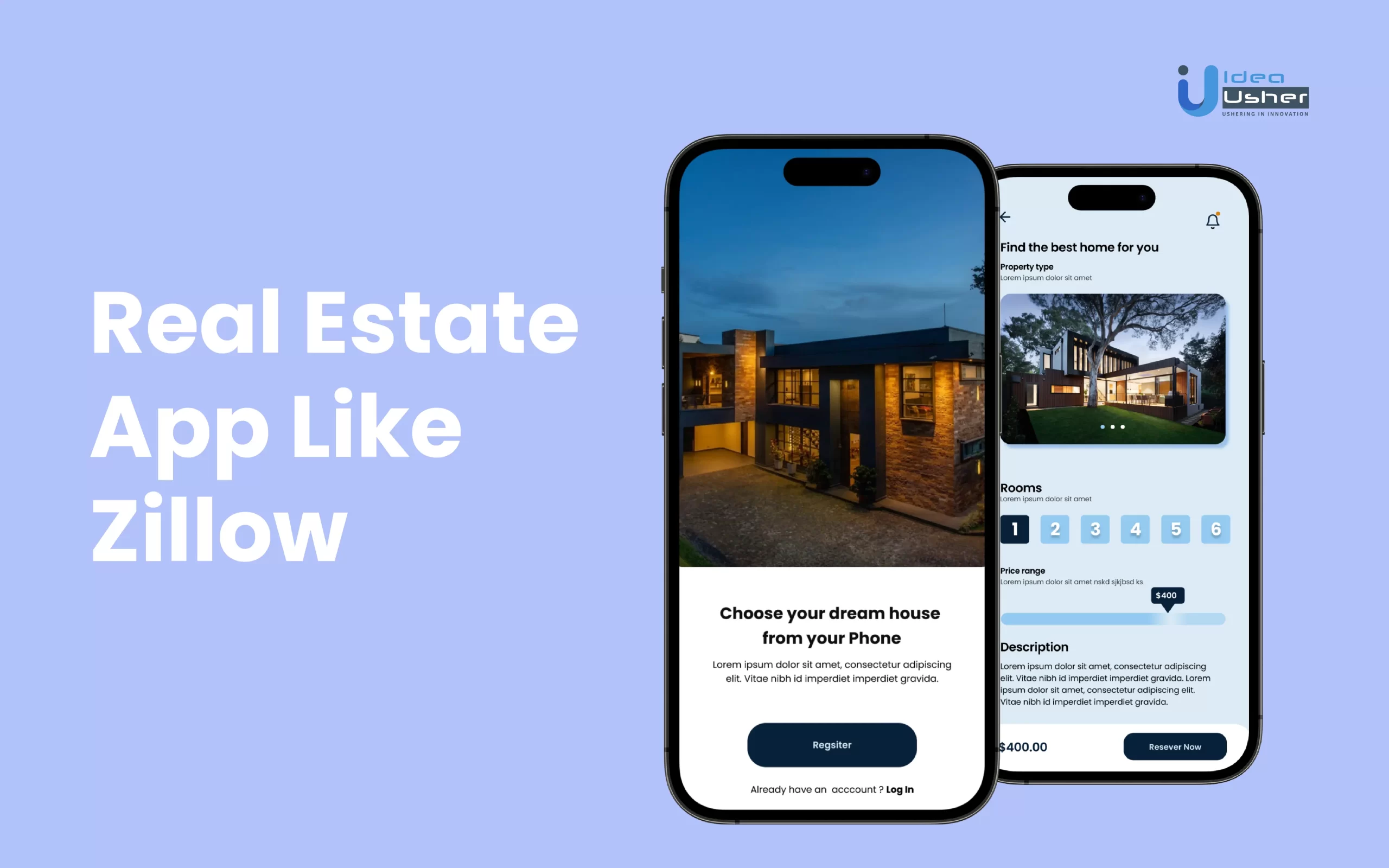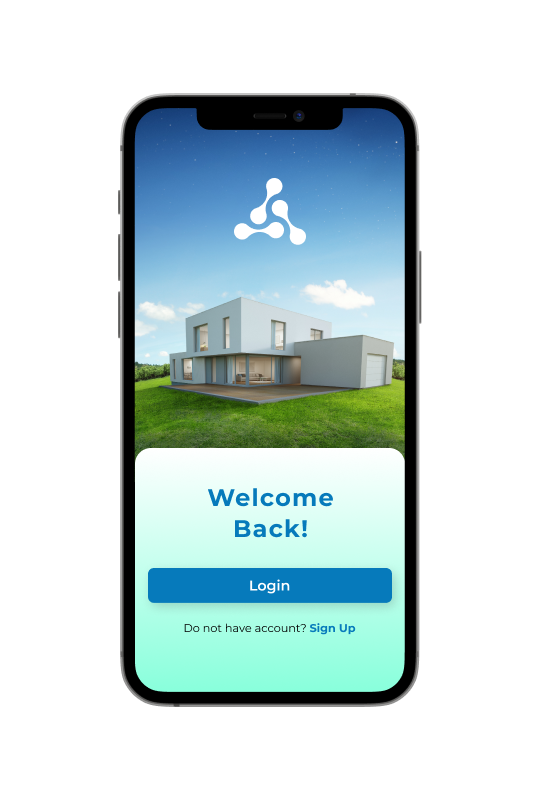The real estate industry has been revolutionized by the emergence of apps like Zillow that provide a one-stop shop for buyers, sellers, and real estate professionals. Zillow’s innovative features, an extensive network of professionals, and user-friendly interface have made it a household name in the United States. If you’re looking to develop a similar app, there are a few key considerations to keep in mind. In this blog, we’ll provide a comprehensive guide to developing a real estate app like Zillow, from essential features and functionalities to monetization models and the role of data analytics and machine learning in achieving success. Let’s dive in and explore what it takes to create a successful real estate app.
What Is Zillow And How Does It Work?
Zillow is a popular real estate app founded in 2006 and has been widely used in the United States since then. The app allows users to:
- Search for homes for sale or rent,
- Estimate the value of their own property, and
- Connect with local real estate professionals.
Zillow provides users with valuable information, creating a solid network of professionals and leveraging technology to enhance the user experience. Here are some of the factors attributing to the success of Zillow:
- There is an abundance of real estate market information, including property details, pricing history, local market trends, etc., available to the user through a user-friendly interface.
- Zillow has created a strong network of real estate professionals, like real estate agents, brokers, and mortgage lenders, who use the platform for marketing their properties and connecting with potential buyers.
- It has leveraged technology to provide users with innovative tools and features, such as virtual tours and 3D floor plans, that enhance the home buying experience and set it apart from other real estate apps.
How Zillow Works: The Business Model
Zillow is a leading real estate platform in the USA, dedicated to simplifying the process of buying, selling, renting, leasing, remodeling, and financing homes. With a user base of over 36 million visitors every month, Zillow has become the go-to destination for people looking to make informed decisions about their homes. It turned its massive user base into a profitable business model. It allowed agents to list their properties and to help users find the right property, Zillow categorized properties into three major segments that helped it grow and generate huge revenue:
- The first segment is for sale, where users can filter properties based on various parameters such as owner, agent, new construction, foreclosure, and more.
- The second segment is potential listings, which includes foreclosed properties, pre-foreclosure properties, and properties listed under the “Make Me Move” category.
- The third segment is for rent, which includes rental buildings and apartments across the U.S. Zillow Rental Manager is a service that enables landlords to accept applications and rent payments through Zillow, while renters pay a fee of $29 for an application that includes a background check and credit analysis.
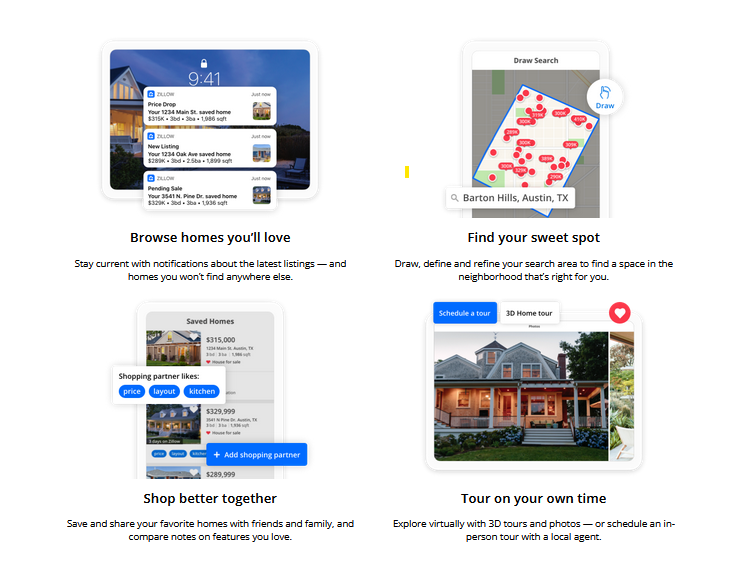
Features And Functionalities Of Zillow Contributing To Its Success
1. User Sign-in And Profile
When developing an app, a user sign-up and login page and separate profiles for home seekers and agents/owners are essential. Users should be able to log in using email or social media profiles, with a secure database to protect sensitive information.
2. Search Engine With A Database
Upon logging in, users are directed to the app’s home page to begin their search. They can quickly filter their search results for optimal matches. These filters might include the following:
- Type of property (house, flat etc)
- Amenities (A/C, parking, storage, etc)
- Floors or stories
- Number of rooms
- Area covered
- Location
- Year built
- Price
If you are a real estate agency and have your property databases, you can develop an app and list your properties through external sources, as listed below:
2.1. MLS
One of the most straightforward methods for obtaining up-to-date property listings is incorporating the Multiple Listing Services (MLS) databases. Managed by the American Realtor Society, realtors use this vast collection of real estate data to exchange listings.
To access and integrate an MLS database into an app, one has to become a member and pay the required annual fee. You can use APIs like Realtor or Spark to incorporate an MLS database into your Zillow-like app.
2.2. Other Listing Platforms
Aside from the MLS, various other platforms and APIs can be utilized to obtain property listings of different sizes and locations. You can select the appropriate platform and API to offer a specific area or type of real estate in your application.
For example, ListHub can be used to extract listings from over 600 MLS sources. ListHub is advantageous for a wide range of listings and a higher likelihood of users finding suitable accommodations.
2.3. Collaborating With Agencies, Brokers, and Owners
You can also create a marketplace app by collaborating directly with other real estate agencies or property owners. This can be achieved by enabling users to publish their property listings on the app. However, this approach has two considerations:
- It is crucial to have extensive real estate listings available at the outset, as users are unlikely to download an app with no listings.
- To prevent fraudulent activity, it is essential to establish the credibility of all involved parties and secure the financial transactions conducted on the app.
2.4. The Property Listing
A real estate listing page aims to provide potential buyers with comprehensive information about a property. This information should include the following:
- Numerous photos and videos accurately depict the property, its amenities, and prices.
- 3D tours and interactive maps to help buyers better understand the property’s layout and location.
3. Messenger
This feature helps in establishing communication between buyer and seller. This feature depends on the model you use for your listings. For example, like Zillow, to collaborate with real estate agents and brokers, you must allow both parties to make arrangements together while ensuring the collaboration’s security. This can be accomplished when realtors’ identities and certifications are verified. You can add a feature for communication in your app or a booking system to make the process much easier.
4. Video Tour
Video tours provide a more individualized experience since an agent can walk the buyer around the property in real-time and answer questions as they come up. In general, these technological advancements offer flexibility, accessibility, and convenience to buyers and sellers in the real estate industry.
5. Machine Learning
Zillow uses three ML models in its program:
- A price estimate model is Zillow’s Zestimate. It is the model on which they have the most internal data. It assists in determining the current value prediction of the property in the market.
- A repair estimate model assists in determining the amount it can cost to fix the home/property before the sale.
- A future price estimate model assists with the prediction of the future value of the property.
6. Data Analytics
Zillow is designed to emulate the user experience of popular social media platforms while utilizing advanced data analysis techniques to identify potential buyers based on their browsing behavior and search history. By leveraging these insights, Zillow can tailor their listings to match the preferences of individual users, thus expediting the sales process and exerting a notable influence on the housing market.
There are few more important features of Zillow that can be included in your real-estate app:
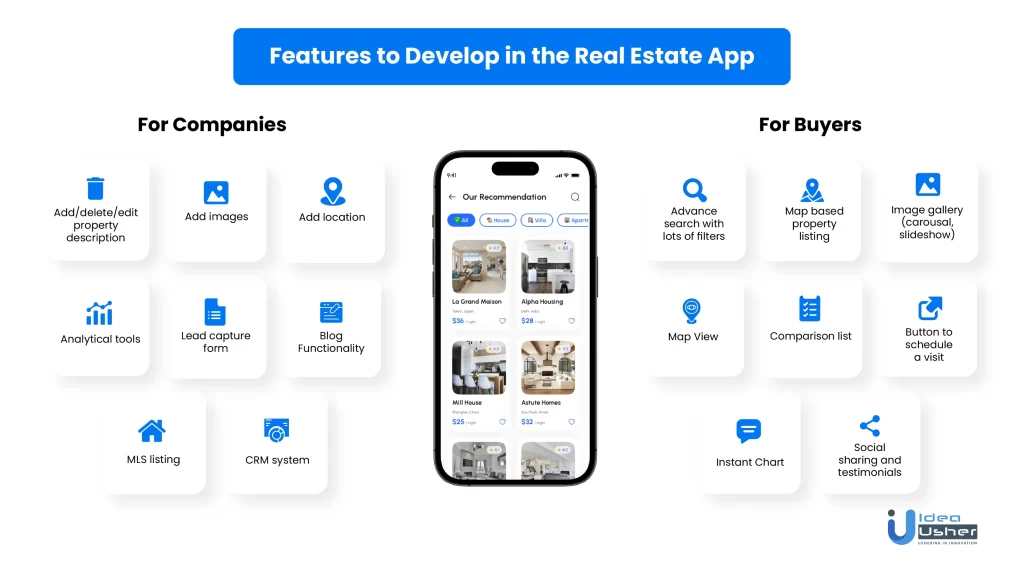
- Property search, where users can search for properties by location, price, the area covered, and other criteria.
- Property listings include detailed information (with photos, videos, and descriptions) of the property, including its facilities, amenities, and nearby attractions.
- Property value estimator, which can provide an estimate of the property’s value based on its description, amenities, and other features from the listing.
- Mortgage calculator that can help users to estimate their monthly payments based on the property’s price, down payment, interest rate, etc.
- Real estate agent directory, where users may find the contact information of the real estate agents, brokers, and customer reviews.
- Notifications and alerts that can keep users informed with updates and listing of new properties matching their search criteria.
- Favorite properties, where users can save the properties they are interested in to access them later.
- Schedule property visits, which can help users to schedule property visits with real estate agents or brokers through the app.
How To Build A Zillow-like Effective Real Estate App?
Developing a real estate app like Zillow requires significant planning and development expertise. Here are some steps to consider when developing a real estate app:
1. Define The Purpose Of The App And Gather Data
Before beginning development, it is essential to determine the app’s primary purpose. Will it be used to search for homes, provide information on the real estate market, or offer other features? A clear understanding of the purpose of the app will guide the design and development process. Additionally, it is also important to gather information about the industry and market trends. Real estate apps rely heavily on data to provide accurate and relevant information to users. This data can include property listings, real estate trends, and market data. It is crucial to gather and organize this data before developing the app.
2. Determine Features And A Development Platform
Based on the data gathered and the purpose of the app, determine what features will be included in the app. For example, search filters, maps, property comparisons, etc., are some essential features of a real estate app.
For a real estate app, there are some specific considerations to keep in mind during the process:
| Property listings | Accurate and current property listings are crucial for real estate apps. To guarantee that the app has an extensive and trustworthy database of properties, you might collaborate with multiple listing services (MLS) or other data suppliers. |
| Search Filters | The majority of the time, users have particular criteria for the properties they are interested in. Make sure the app offers effective search filters, such as those for location, property type, and price range. |
| Maps | Users may view the locations of homes and convenient facilities close by using maps. Make sure the app has a solid mapping system and offers tools like directions, street view, and a satellite view. |
| Communication | Communication between buyers, sellers, and agents is frequently necessary for real estate transactions. To make it easier for users to communicate within the app, think about incorporating services like chat or messaging. |
| Analytics | A lot of data is produced by real estate applications. Use analytics to monitor user activity, evaluate the effectiveness of your app, and spot potential development areas. |
When it comes to the development platform, the choice of the same entirely depends on the budget, features of the app, and your target audience. There are three types of platforms to choose from – native development, hybrid development, or cross-platform development can be considered.
3. Design And Develop The App
Design the app with a user-centric approach, ensuring it is easy to navigate and use. This will require an intuitive user interface, simple visual hierarchy, and appropriate use of colors, typography, and imagery.
After the design, you can begin with the development of the app. You can develop the app with a focus on functionality, performance, and scalability. This may require incorporating third-party APIs and building a backend infrastructure to handle user data and interactions. You can use the tech stack suggested below or consult with your development team to determine what suits your requirements and budget.
3.1 The Tech Stack May Use
We recommend the following tech stack for building a real estate marketplace like Zillow:
| Development Language | Python and Java |
| Cloud Storage | Amazon S3 |
| Cloud Hosting | Amazon EC2 |
| Data Management | CoreData and Real |
| Version Control | Jenkins |
| For Android | Kotlin or Java |
| For iOS | Swift or Objective C |
| Additional APIs for geographical information | SimplyRets, Google Places, MapBox, CoreLocation, and Mapkit or CoreData. |
| For real estate websites/apps like Zillow with trending features | Facebook SDK (social media sharing capability). |
| Notification | Apple Push and Firebase SDK |
4. Test, Launch, And Maintain
Once you are done with the development phase, you can test the app rigorously to ensure it is free of bugs and performs well on different devices and platforms. This may require a combination of automated and manual testing methods.
After the successful removal of bugs and performance issues, you can launch the app on your chosen platform. This may require submission to app stores or other distribution channels.
The last and crucial step in the entire process is the maintenance of the app. You can maintain your real estate app by providing regular updates, improving features based on user feedback, and fixing bugs. It plays an important role in maintaining the user base and keeping up with market trends.
Tech Upgrades To Outperform Zillow’s Real Estate App
Creating a successful real estate platform is a challenging task. Understanding how to create a website similar to Zillow is one thing, but differentiating it from the competition is quite another. Your software solution must utilize the most recent technology if you want to compete in this industry. This section includes some of the newest technologies that may be used to build an exceptional and profitable real estate platform.
1. Virtual Reality
VR technology can make property tours even more immersive. Virtual tours enable prospective homebuyers to view a property from the comfort of their home, and brokers may forego in-person showings to save time and resources. It can also be helpful for overseas clients who are unable to view a property in person.
2. Blockchain
Blockchain technology has a lot to offer the real estate industry. While it is often associated with cryptocurrency, blockchain can be used to secure and verify transactions and help with safe property data storage and exchange. By incorporating blockchain technology into your real estate platform, you can provide your users with a secure and reliable platform, which can help you build trust and credibility in the market.
3. Digital Twins
Digital twin technology involves the creation of exact digital 3D copies of real housing. This technology allows tenants and homebuyers to explore the property in subtle detail just from their laptops or smartphone. By using digital twin technology, you can create a more engaging and interactive experience for your users, which can help you stand out in the market.
To build a successful real estate platform, it is important to incorporate the latest technologies. By using them and more such advancements, you can create a more engaging and interactive experience for your users, build trust and credibility in the market, and stand out from your competitors.
How Does Zillow Generate Revenue Despite Being A Free Platform?
Zillow is a real estate company that generates revenue through various sources, including ad sales to property management companies, iBuying, premier services for real estate agents, and ad sales to mortgage lenders and other businesses.
Here is a breakdown of their monetization model:
1. Ad Sales To Property Management Companies
Zillow charges companies to advertise their listings on the Zillow Rental Manager, which includes websites like Trulia, HotPads, etc. Zillow sends qualified leads to these advertisers to help them maximize their investment.
2. iBuying
Zillow uses iBuying technology to streamline the transaction process for sellers. Customers can use their online platform to send details of their homes, and the company responds with a cash offer within days. If Zillow buys the house, it fixes and resells it within 90 days.
3. Premier Services For Real Estate Agents
Their website has Premier Agent branding, which includes multiple listing service searches, client reviews, past sales, photos, and videos. This feature allows real estate agents to purchase advertising with Zillow to target users in their local markets.
4. Ad Sales To Mortgage Lenders And Other Businesses
Zillow sells advertising space on its site to mortgage lenders and other businesses that want to reach Zillow consumers. Most of these advertisers are in the real estate industry, but some sell telecommunications services, automotive products and services, insurance, and consumer products.
While Zillow’s revenue mainly comes from ad sales, the company still faces risks that could lead to a decline in ad revenue. Risk factors with the Zillow monetization model are:
- Existing advertisers end their relationships.
- Competitors become more attractive.
- Agents stop seeing value in advertising on Zillow.
- The market crash in the real estate market
- Drop in consumer interest in home buying and mortgages.
How Zillow Dominated The Real Estate Market: A Case Study
Zillow Group, an online real estate company, is performing well despite continuing challenges in the housing market, according to a research note by J.P. Morgan analyst Dae Lee. Lee initiated coverage of Zillow with an Overweight rating and a $48 price target, citing the company’s core demand generation-based business model, solid margins, and active share repurchase program as reasons for its success. Lee also mentioned that Zillow has a healthy balance sheet to continue investing through near-term headwinds, which should strengthen its leadership position.
While the housing market has been going through a difficult stretch, Lee believes the industry is cyclical, and he expects recovery back to normalized levels to begin in 2023. Lee also likes Redfin as an online real estate stock but said that the company’s brokerage model makes navigating through the current volatile environment more challenging. Lee initiated coverage of Redfin with a Neutral rating and an $8 price target.
Following the research note, Zillow’s shares rose by 2.3% to $42.06. Lee’s positive outlook on Zillow’s performance in the current real estate market makes it an attractive investment opportunity for investors who are interested in the real estate industry. However, as with any investment, it is important to remember that stock prices can be volatile and carry risks, so investors should always do their own research before making any investment decisions.
Why Are Real Estate Apps A Lucrative Business?
- In 2023, the US real estate industry will generate more than $395 billion, making it the largest in the world.
- Over 60% of home buyers and sellers in 2020 utilized electronic signature tools.
- In 2021, 79% of Americans expressed interest in 3D virtual tours and digital floor plans.
- As per the 2022 report, 60% of sellers considered virtual tours a vital aspect of home listing.
- 76% of sellers regarded floor plans as highly important when listing their homes for sale.
- With millennials entering the real estate market, the demand for tech-savvy tools in the industry has increased.
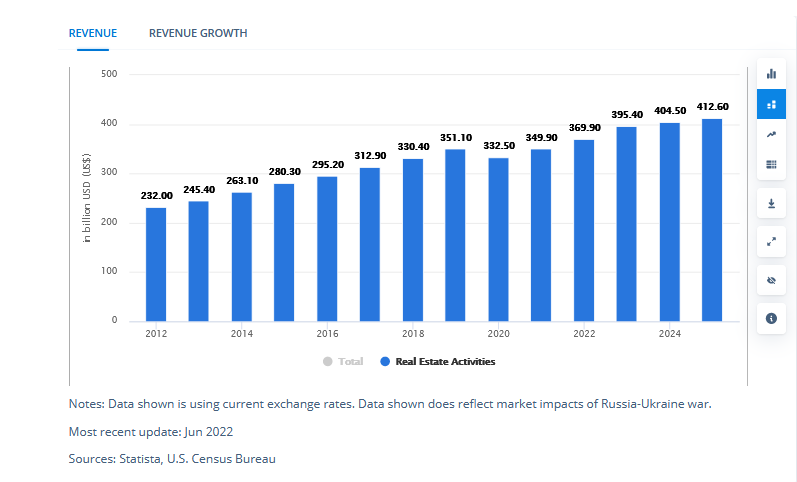
Zillow is the most popular property app in the United States, boasting 245 million unique monthly users in 2020. Its popularity can be attributed to a host of useful features, including:
- The largest real estate database,
- A user-friendly search engine
- Numerous filters,
- Feature for buying and renting,
- Detailed information on each property
- Features like 3D tours, a mortgage calculator, etc.
While it may seem tempting to create an exact replica of Zillow, standing out to outrun the best is important. Also, users may like to opt for the original app over a copy. Therefore, while incorporating industry best practices, it is recommended to include unique features that differentiate your app from others in the market for the success of your real estate app.
Get Your Real Estate App Developed With Idea Usher
To create a successful real estate app, combining the best practices of popular apps with unique features that distinguish your app from competitors is important. While a visually appealing design and interesting features can be beneficial, customers are primarily seeking an all-in-one app that simplifies the process of finding their ideal dream property.
Idea Usher can help you conceptualize a distinctive design that includes all the necessary features that your app needs to be the best under your budget. If you are prepared to create a successful real estate app, we are here to make it real while implementing your ideas and identifying the key factors that contribute to a good app. We can help your real estate app stand out in a crowded market.
Build Better Solutions With Idea Usher
Professionals
Projects
Contact Idea Usher at [email protected]
Or reach out at: (+1)732 962 4560, (+91)859 140 7140
FAQ
Q. How do real estate apps determine home value?
A. Real estate apps typically determine a home’s value by analyzing various data points, including recent sales of comparable properties in the area, tax records, the size and location of the property, and other factors that may impact its value. These apps use algorithms and advanced analytics to process this data and generate an estimate of the property’s value, often referred to as an Automated Valuation Model (AVM).
Q. What is the best alternative to Zillow?
A. Realtor.com, Zumper, CoreLogic Matrix, Apartments.com, LoopNet, Redfin, GoMLS, and Crexi are some of the best alternatives of Zillow available in the market today.
Q. What app shows the most houses for sale?
A. Two of the biggest websites for real estate listings are Zillow and Realtor. Realtor performs a great job of putting buyers and sellers in touch with agents, while Zillow provides listings from both brokers and agents as well as for-sale-by-owner homes.
Q. Is MLS outdated?
A. The MLS is still the most accurate and up-to-date way to locate properties for sale in most locations, despite the emergence of large real estate websites like Zillow, Trulia, Redfin, etc.
Q. Why is Zillow so successful?
A. Zillow’s success can be attributed to several factors, including its user-friendly interface, vast database of property information, and innovative use of technology in the real estate industry. Additionally, Zillow’s revenue model, which includes advertising from property management companies, real estate agents, and mortgage lenders, has proven to be highly profitable. The company’s focus on providing value to both buyers and sellers has also helped to establish it as a trusted source of information in the real estate market.
